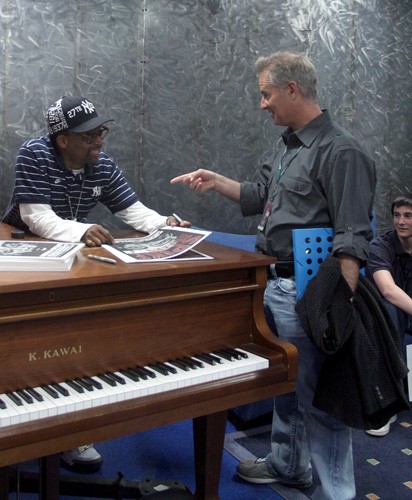In his last college lecture for the school year, renowned filmmaker and director Spike Lee spoke words of encouragement to hundreds last night at Centennial Hall.
With successful films such as “”Do The Right Thing”” and “”Malcolm X”” to his name, the director came out looking relaxed in white Jordan Spiz’ikes and a polo shirt over a long-sleeved shirt, and asked, “”Is Brooklyn in the house?”” Lee, 53, made no effort to conceal his love for his hometown, wearing a New York Yankees cap.
Lee began by discussing his path to filmmaking. His mother dragged the young Lee to art events. “”I was kicking and screaming,”” Lee said. “”Now I’m glad she brought me.”” It was this early exposure to art, he said, that created the foundation for him to pursue filmmaking.
Lee then went to the historically black, all-male Morehouse College, claiming to have been a terrible student. “”I was a C student … I didn’t apply myself,”” he says.
However, his grades improved once he found what he loved to do. The summer after his freshman year, Lee said he used a Super 8 camera given to him as a Christmas gift to film block parties and the looting that went on in his neighborhood during the late ’70s. He encouraged students, especially graduate students, to do what they love.
“”Hopefully the major you’ve chosen is what you love and not necessarily what you think will make you the most money,”” Lee said.
He was blunt about parents shaping their child’s future: “”Parents kill more dreams than anybody.”” The audience responded with a resounding round of applause. Lee added that while he had strong family support, he knows this is not the case for some students. He then said, “”You succumb to parental pressure, but then years later you become a miserable person.””
Moral support was crucial for Lee, but there were times when he had to rely on himself financially to see his vision come true. He told students they should go around the financial obstacles that would threaten the creation or the release of their films.
Some members of the audience booed when Lee declared love for the University of Southern California’s Fighting Trojans football team. Lee laughed and said, “”Don’t hate. When you become national champions, then we could talk.””
During his discussion of the “”digital revolution”” and YouTube, Lee caught a student videotaping his talk, much to the student’s embarrassment. “”Busted!””
During the audience Q & A session, questions ranged from Lee’s favorite directors, getting into the business as an actor, to directing a comic book movie, to the contradictions in American history.
Lee talked about how America dominates the world not through nuclear power, but through the export of culture and media stereotypes. He also remarked on the contradiction between the principles and actions of the Founding Fathers.
“”Thomas Jefferson was a pedophile,”” Lee said. “”Sally Hemmings was 14 years old. How can these great minds come up with this great democratic document and own slaves and create genocide against Native Americans?””
The reactions to Lee’s lecture were positive overall. UA alumnus Menelik Bakari, 60, said he found Lee’s discussion about Tyler Perry interesting. Lee clarified that there is no conflict between him and Perry.
For Bakari, the two filmmakers represented different audiences and philosophies.
“”It’s like the old minstrel thing: Do you want to make people just kind of laugh and make them feel good or do you want something like ‘Miracle at St. Anna,’ a serious, serious movie with a serious theme? So I’m more about that than I am about the Madea (films),”” Bakari said.
Tom Burrish, a psychology senior, enjoyed Lee’s encouragement to follow his dreams, especially since he’s a musician.
Meet Spike Lee Contest winner Mitch Turbenson, a classical guitar performance and mathematics sophomore, said, “”What (Lee) said about parental pressure, every student should hear.”” According to Turbenson, his parents disliked his choice of major.
“”(Lee) was so humble considering everything he has been through,”” said Monique White, an interdisciplinary studies senior. “”I’m glad that he always touches limits and boundaries people are afraid to touch.””









